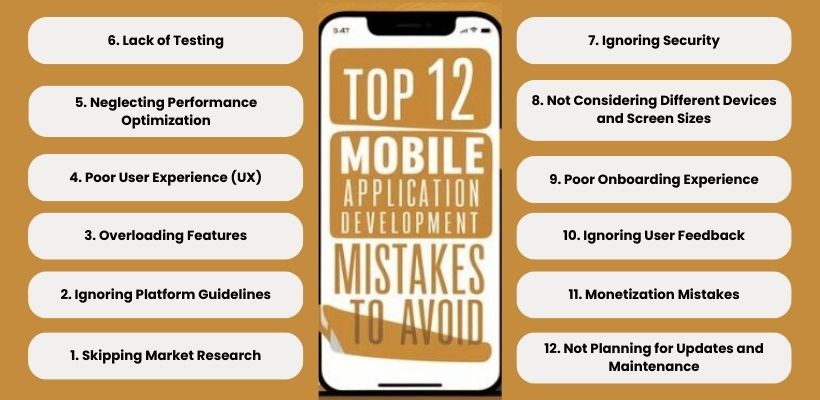
Effective mobile application development involves more than just coding; it requires meticulous planning, design, and execution. By understanding the common mistakes to avoid, developers can streamline the development process and deliver exceptional user experiences. Let's explore these critical mistakes in detail. Before diving into development, thorough market research is essential. Failing to understand user needs and market demands can result in an app that fails to resonate with its target audience. Conducting comprehensive market research helps identify opportunities, refine app features, and align with user expectations. Each mobile platform has its own set of design and development guidelines. Ignoring these guidelines can lead to inconsistencies in user experience and potential rejection from app stores. Developers must adhere to platform-specific guidelines to ensure compatibility and usability across different devices. Attempting to cram too many features into an app can overwhelm users and diminish its usability. Instead, focus on incorporating essential features that align with the app's purpose and provide value to users. Streamlining features enhances user satisfaction and promotes engagement. User experience plays a pivotal role in the success of a mobile app. Complex navigation, slow loading times, and cluttered interfaces can frustrate users and drive them away. Investing in intuitive UX design improves usability and fosters positive user interactions. Optimizing app performance is crucial for retaining users. Slow performance, crashes, and excessive battery consumption can tarnish the app's reputation and deter users from returning. By optimizing for speed, stability, and resource efficiency, developers can enhance the overall user experience. Thorough testing is paramount to identify and rectify potential issues before launching the app. Functional, usability, and compatibility testing help uncover bugs and glitches that may compromise the app's performance. Testing ensures a seamless user experience across different devices and operating systems. Security should be a top priority in mobile app development. Failing to implement robust security measures can leave the app vulnerable to data breaches and cyber attacks. Incorporating encryption, secure authentication, and data protection safeguards user information and enhances trust. With a plethora of devices and screen sizes available, developers must ensure their app is compatible across various platforms. Designing with responsiveness in mind ensures optimal viewing and functionality across different devices, enhancing accessibility and user satisfaction. The onboarding process is the user's first interaction with the app and sets the tone for their experience. Lengthy or complicated onboarding processes can deter users from engaging further with the app. Keeping the onboarding experience simple, intuitive, and brief enhances user retention and adoption. User feedback is invaluable for improving the app's functionality and user experience. Ignoring user feedback or failing to iterate based on suggestions can result in missed opportunities for enhancement. Actively soliciting and incorporating user feedback fosters a collaborative relationship and promotes user satisfaction. Choosing the right monetization strategy is essential for balancing revenue generation with user experience. Implementing intrusive ads or overly aggressive monetization tactics can alienate users and lead to decreased engagement. Developers should prioritize user experience while exploring monetization options. The mobile application development process doesn't end with the initial launch; it requires ongoing updates and maintenance to remain relevant and functional. Failing to plan for regular updates, bug fixes, and maintenance can result in an outdated and unsupported app. Continuous improvement ensures long-term success and user satisfaction. Effective mobile application development requires avoiding mistakes like skipping market research, neglecting user experience, and ignoring security. Prioritize user feedback, optimize performance, and plan for updates to ensure success. Are you ready to develop a successful mobile application that stands out from the competition? Contact IIH Global, a leading mobile app development company in the UK. Email us at sales@iihglobal.com to discuss your project requirements and transform your mobile application development idea into reality.12 Critical Mistakes to Steer Clear of in Mobile App Development
1) Skipping Market Research
2) Ignoring Platform Guidelines
3) Overloading Features
4) Poor User Experience (UX)
5) Neglecting Performance Optimization
6) Lack of Testing
7) Ignoring Security
8) Not Considering Different Devices and Screen Sizes
9) Poor Onboarding Experience
10) Ignoring User Feedback
11) Monetization Mistakes
12) Not Planning for Updates and Maintenance
Conclusion








